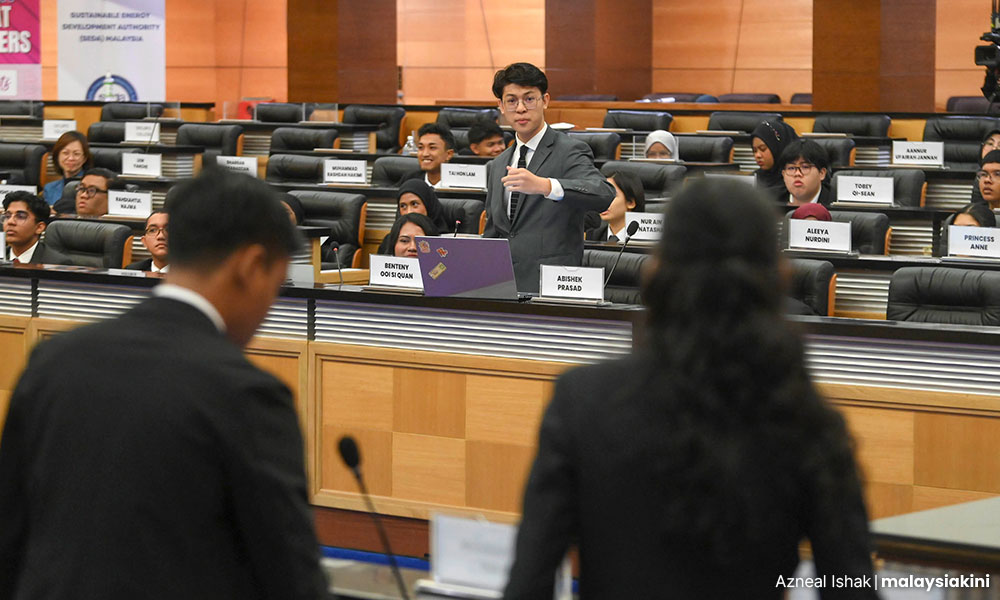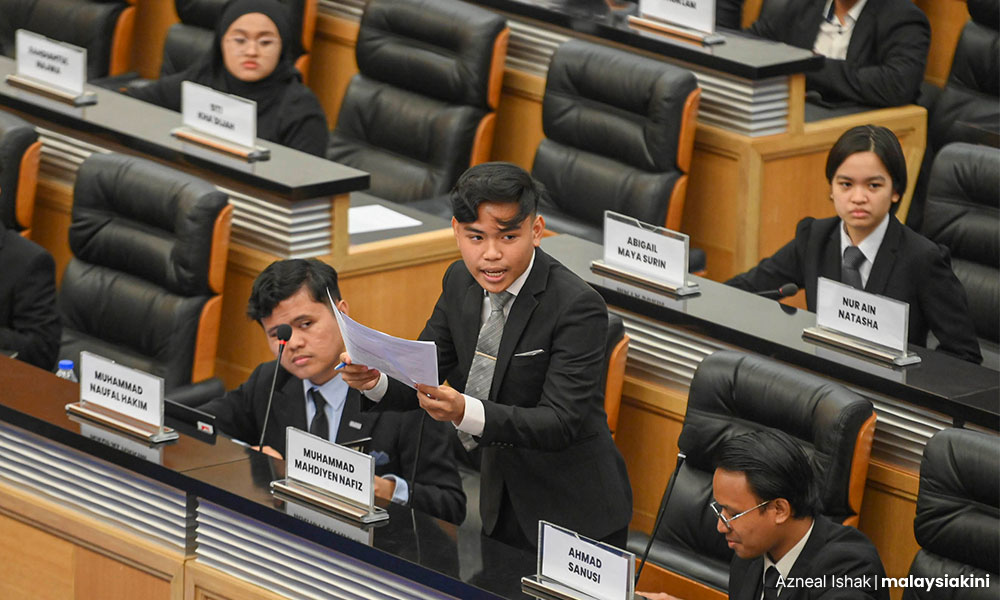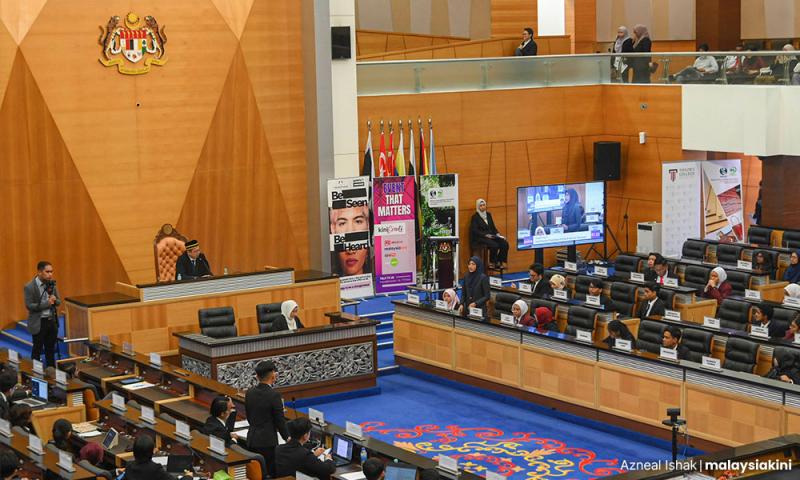LETTER | Youth politics should be encouraged
LETTER | We, as Malaysians, ought to aspire to a reality where the political participation of our youth - in which they are allowed not only to voice their grievances but welcomed to contribute towards national reform - is actively encouraged.
To the contrary, while significant strides have been made in youth empowerment - ie the establishment of a Youth Parliament, the lowering of the voting age, progressive tolerance of student-run NGOs and greater accommodation for expression - there remains to be an elephant in the room that needs to be addressed.
We should democratise political discussion by offering these lifelines to our youth - under the auspices of empowering the future generation - but simultaneously snatch them away when it becomes too bureaucratically inconvenient to have a mature, politically conscientious youth.
It is in sustaining this vicious cycle that we risk exhausting their enthusiasm, causing them to feel fatigued with disillusionment as they perpetually swing to and fro between institutional affirmation and repulsion.
Prominent institutions such as Taylor’s University have dedicated extensive efforts towards youth participation in dialogues that pertain to social change.
The recently held Taylor’s Education & Social Change Townhall jointly organised by Taylor’s University and Taylor’s Speakers Corner in collaboration with Heya (Higher Education Malaysia Association) provided a platform for youths, representing different organisations such as the many clubs and associations from Taylor’s University, the Malaysian Philosophy Society to share their unique perspectives on the diverse approaches towards social reforms.
Discussion prompts such as “What are some examples of integrated social change within higher learning institution curriculum?” and “How can higher learning institutions support young people in making social changes?” which were shared at the event inspired substantial political dialogue and generated an immense atmosphere of enthusiasm and passion.
The event also featured Ong Kian Ming, director of the Philosophy, Politics and Economics programme at Taylor’s University. This allowed for great exposure to the reality of the youth political scene in Malaysia through the sharing of his many insights as to his renowned public service and the best means to approach social change.
He emphasised the importance of recognising the utility of exploring meaningful social projects that can be undertaken, to promote collaboration with different stakeholders to bring those projects to fruition and explore the type of communities that one could be a part of to launch social projects.
The success of the initiative by Taylor’s University is one such example of how particular initiatives can cater strong yearning in Malaysia for growing youth involvement in social change; empowering the youth to greater heights of activism.
The Malaysian Philosophy Society, in its efforts, have introduced initiatives to promote in-depth discussion of pertinent social issues.
Its’ monthly “Thinkers Café” is a bi-monthly (both virtual and physical) which invites Malaysians, many of whom are youths, to participate in discussions that tackle social and political issues through a practical philosophical lens.
These efforts serve to inspire a culture of critical thinking, one that is deeply enmeshed in the Malaysian psyche.
The “Kritikos” project was one such example of this; where the Malaysian Philosophy Society collaborated with NGOs across Malaysia to teach critical thinking skills in Malaysian schools by exploring the many philosophical approaches and analyses that can be applied to real-world issues. Such initiatives could embolden youth leadership infrastructure.

The deliberate expulsion of the youth from the political space must not be seen as something trivial - it is an amputation of an important backbone that supports the organ that is Malaysian democracy, the long-term side effects of which threaten to severely jeopardise the country’s future.
There can be no real prospect of change for the future if there isn’t an envisioned national mission to develop the political maturation of our young.
The issues currently plaguing the world are increasing in their complexities, requiring greater support from all areas of the Malaysian social strata as relying solely on the previous generation will inevitably lead to stagnation; a recipe - an outright policy disaster - for a country that may come to have significantly underwhelming response to the highly technical concerns of the future - the adverse implications of which directly impact our youth.
The youth therefore have a personal stake in the country’s development and this must be accommodated so that the wheels of economic prosperity, social cohesion and political stability can continue to be passionately.
There needs to be a paradigm shift in Malaysian politics, one that is holistic - what is needed therefore are sustainable measures that make allowances for incremental steps towards the political participation of the youth on a more comprehensive scale - covering more areas of discussions on national policy and reform - while simultaneously ensuring that the welfare of both the youth and the country’s national security is accounted for with strong safety measures instituted.
Democratisation yields extensive benefits to those that facilitate it. However, the very real threat of those who intend to malign this process, subverting democracy and co-opting such initiatives to weaponise the youth to score contrived political scores - dividing and atomising Malaysian communities - must be taken into consideration.
The nature of such a shift would work within the pragmatic constraints of the Malaysian context to establish a long-term plan to cultivate a strong ethos of youth leadership.
The government - under the stewardship of Prime Minister Anwar Ibrahim - has expressed its interest in institutionally supporting the rise of the next generation.
The prime minister, just last month at Educational Reform for Malaysia’s Future Well-being lecture event, was quoted to have said that “smart Malay, Chinese, Indian, Iban, Kadazan children rise as the force of the nation to defend our rights, values, moral options, truth and justice, stand up as the new strength of Madani society.”

These sentiments hint at Malaysia’s potential trajectory towards a bright future - where the youth may be invited to contribute to the nation.
Considering the prime minister’s vision of Malaysia Madani, I wish to suggest some policy prescriptions - commensurate with the six core values of the Madani concept - that the government could implement to better facilitate youth participation in politics.
Sustainability and trust
The appointment of a government commission - one that consulted with all stakeholders; from NGOs to educational institutions - to conduct an exclusive and extensive review of pre-existing policies and legislation that surrounds the status of youth concerning the political environment would be a revolutionary step towards incorporating more youth into the political dialogue.
Advancing such a cause would be crucial in determining whether there are underlying issues in the country that inadvertently serve to hinder progress.
The existence of such a commission - in the eyes of the public - not only revives significant trust in our public institutions, it can further thorough studies to evaluate the feasibility of reform in this area.
Innovation and prosperity
Efforts to encourage the creation and innovation of new political simulation exercises for the youth to participate in would ensure that there are established channels that strategically engage with them in a way that facilitates their proactive involvement.
These simulation exercises would take the form of dialogues, parliamentarian discussions; debates and workshops and could be designed in a way that provides youths with a safe platform to explore and participate in important discussions that surround national policies.
Malaysia is home to a smorgasbord of NGOs and student communities that have been yearning for such activities to be widespread.
Coordinating with these different organisations to advance innovative national activities of the youth would condition the young generation to assume an avid interest in the country’s affairs; inspiring a new wave of Malaysians aspiring to develop the nation.
Respect and compassion
Navigating the political landscape, particularly if one is uninformed can be rather intimidating as there are serious sensitivities that are latent in the country. Given that the youth are already expected to develop political opinions of their own when they vote at their polls as early as a year after graduation from school, efforts must be instituted to guide young people in exploring the political space.
Newfound initiatives to introduce educational campaigns in schools and institutions of higher learning that serve to improve political and civic literacy among students - all the while disseminating values of respect, tolerance, and compassion towards one another - would be instrumental in developing a youth political space that is pristine from the provocation of tensions.
These campaigns would also serve to counteract extremist forces that deliberately target the youth. This would ensure that Malaysia progressively transitions into a less conflict-ridden political climate.
We must continue to strive to encourage youth politics in Malaysia.
The views expressed here are those of the author/contributor and do not necessarily represent the views of Malaysiakini.
RM12.50 / month
- Unlimited access to award-winning journalism
- Comment and share your opinions on all our articles
- Gift interesting stories to your friends
- Tax deductable
